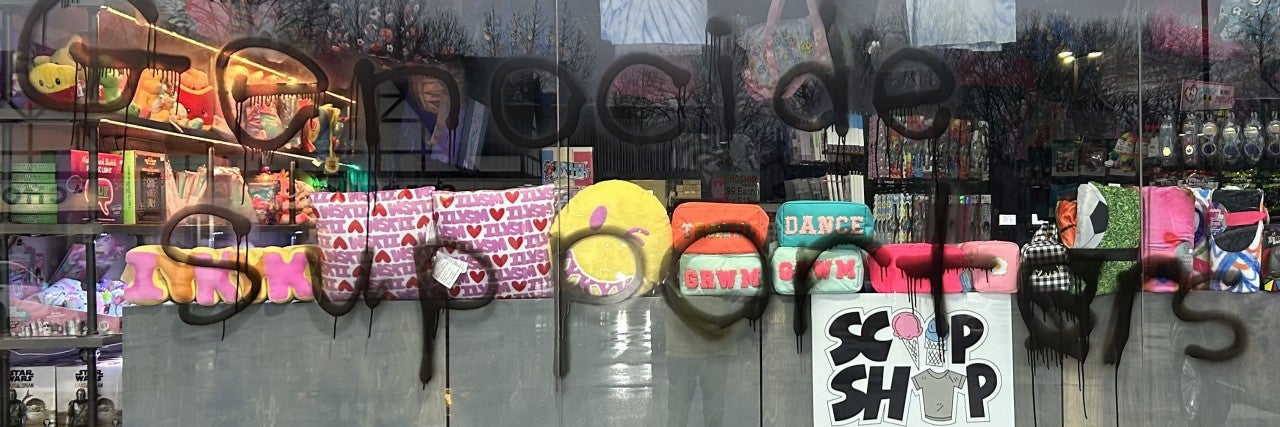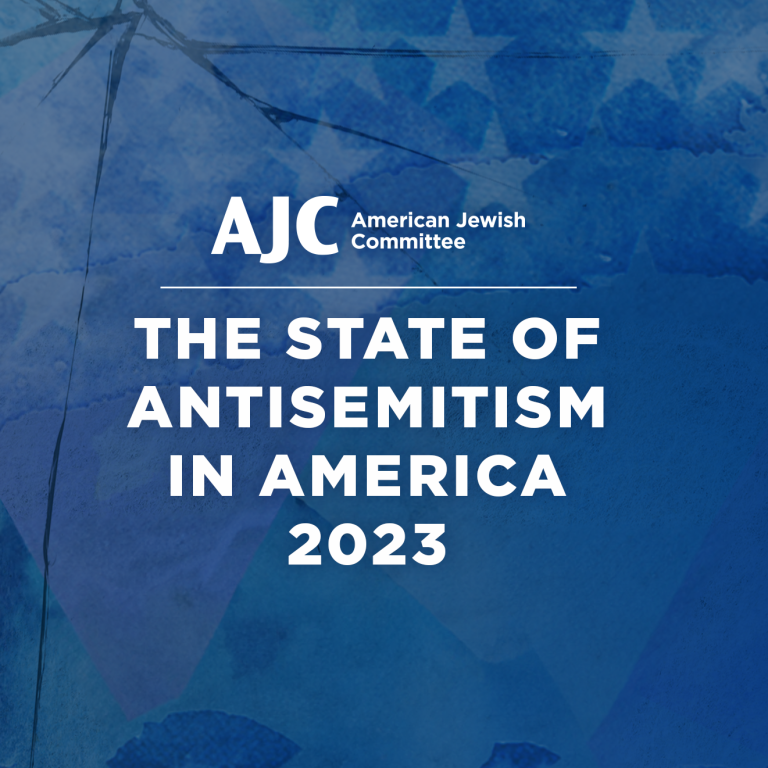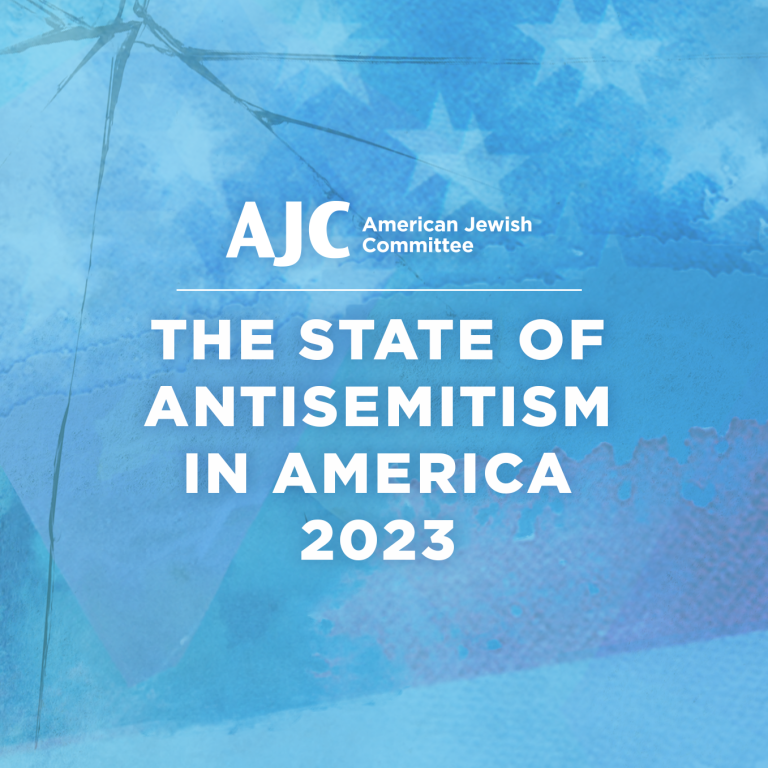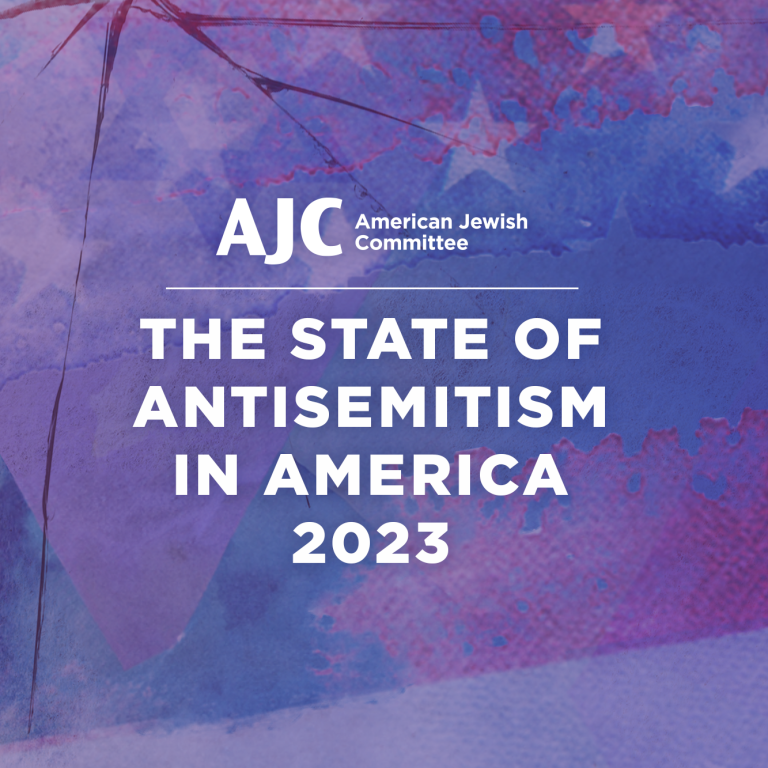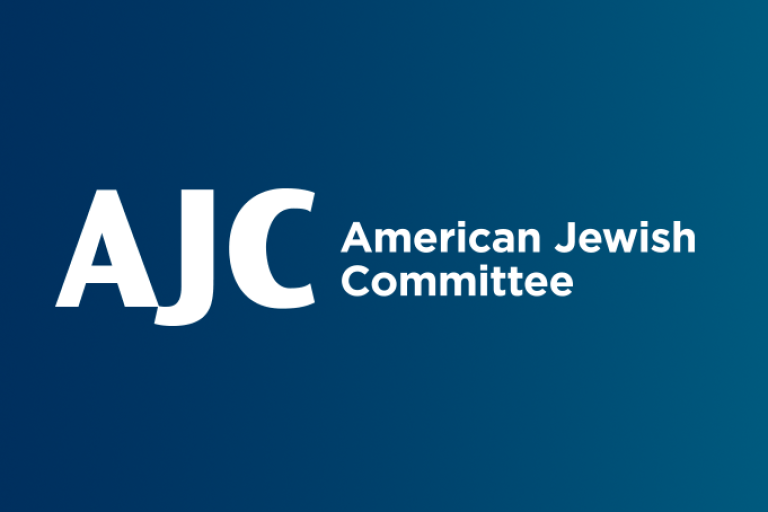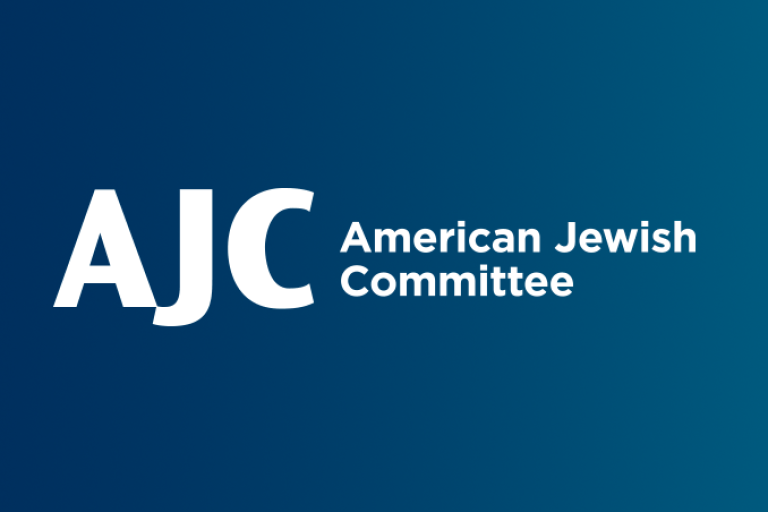February 15, 2024
One in five U.S. Jews reported that local businesses where they live have been the target of antisemitism in the past five years, revealed AJC's State of Antisemitism in America 2023 Report, published this week.
To dive deeper into this concerning trend, we spoke with Adam Deutsch who, since October 8, has displayed a “We Stand With Israel Sign” in the window of his Scarsdale, NY ice cream shop. In January, his storefront was spray painted with the words “genocide supporters.” Hear from Deutsch on how his local community rallied against this hateful action and why he’s been even more vocal about his support for the Jewish state and prouder to be Jewish.
*The views and opinions expressed by guests do not necessarily reflect the views or position of AJC.
Episode Lineup:
- (0:40) Adam Deutsch
Show Notes:
Learn - How much do you really know about rising Jew hatred? Take our short quiz to test your knowledge.
Listen – People of the Pod on the Israel-Hamas War:
- How A 10/7 Survivor is Confronting Anti-Israel Activists on College Campuses
- Tal Shimony Survived the Hamas Attack on the Nova Music Festival: Hear Her Story of Courage, Resilience, and Remembrance
- How to Mark International Holocaust Remembrance Day in a Post-October 7th World
Follow People of the Pod on your favorite podcast app, and learn more at AJC.org/PeopleofthePod
You can reach us at: peopleofthepod@ajc.org
If you’ve appreciated this episode, please be sure to tell your friends, and rate and review us on Apple Podcasts.
Transcript of Interview with Adam Deutsch:
Manya Brachear Pashman:
The contrast was stark. The words “genocide supporters” scrawled in black spray paint across the windows. On the other side of the glass, giant stuffed animals and pillows embroidered with the abbreviation for I love you so much. This was the scene one morning in January at The Scoop Shop, an ice cream and gift store at a shopping plaza in Scarsdale, New York. The vandals also left their mark on a nearby boutique. Both stores had one thing in common: Jewish owners.
This week, AJC released The State of Antisemitism in America 2023 Report, which for the first time found that one in five American Jews reported local businesses where they live had been the target of antisemitism in the past five years.
With us to talk about the incident in January is the owner of the Scoop Shop, Adam Deutsch.
Adam, welcome to People of the Pod.
Adam Deutsch:
Thank you for having me.
Manya Brachear Pashman:
Adam, if you wouldn't mind walking us through that morning when you discovered the graffiti on your storefront.
Adam Deutsch:
Sure. So my brother actually got a call, we're partners, got a call around 7am from the people who do the maintenance in the shopping center. They were with the police who actually noticed the graffiti. So we got a call from them saying that something was written on the store window.
My brother was in the middle of getting ready to drop his kids off at school so he was planning on coming right after that. He called me. And we met over there and they were already starting to clean it off. But at first I couldn't really read what it said. The handwriting was very mishy mashy.
But once we actually saw it, we realized that it was not good. Not like it would have been good anyway, graffiti on the store. But we realized it had something to do with the fact that we supported Israel or that we were Jewish or something along those lines. We weren't positive at first.
Manya Brachear Pashman:
So how did the vandals know to target your business?
Adam Deutsch:
So we have a sign that says We Support Israel with the Israeli flag in our storefront window. I think it was October 8, someone came to the shopping center and asked if we would put it up. We said absolutely. So we've had it up for a few months. A few shops in the shopping center do as well, the other store that was vandalized did also.
So I don't think it had anything to do with the fact that I'm Jewish, necessarily. Because how would they know that? However, the fact of what they wrote, that they believe what's going on in Israel is genocide made them write what they wrote.
Manya Brachear Pashman:
So how did law enforcement respond? And I'm also curious if the shopping plaza’s staff contacted law enforcement when they contacted you and your brother?
Adam Deutsch:
The police were actually, they do rounds in the shopping center. They do like a drive by all the time. So the police actually are the ones that saw what happened, the New Rochelle police department. They, the guys who do the maintenance of the shopping center were changing the garbages at the time. So it was like they told them, they called us. But there was a lot of police presence. And you know, the district attorney's office and there was FBI. I thought it was handled very well.
Manya Brachear Pashman:
So it sounds like they did report it as a hate crime.
Adam Deutsch:
Yeah, so it was originally being reported as a possible hate crime. So I know that they have not caught the person. But I was also told that since it was written on glass, as opposed to brick, which is not permanent. And the fact that it wasn't really derogatory towards Jews or towards any group, that it wouldn't have been a hate crime. If they got caught, they wouldn't have been arrested for a hate crime.
Manya Brachear Pashman:
I should add that the AJC survey found that a vast majority of American Jews and American adults, 93% of Jews, 91% of the American public, believe it's important that law enforcement report hate crimes, or even be required to report hate crimes to a federal government database.
So I wonder if your incident is going to be reported and recorded since it was on glass. So bizarre.
So and neighbors, how did the neighbors respond?
Adam Deutsch:
First of all within the first–this was at eight o'clock in the morning, by the time we got there, within the first half hour of us being there, my phone received probably 20-30 text messages. Someone created this flyer that they were planning on doing an ice cream social get together and a pro-Israel rally at four o'clock.
I was planning on working by myself because it's January in an ice cream store, it's pretty quiet. I right away started texting all my employees, who are in high school. So I knew they couldn't get there until after three o'clock. But I said you got to come. I need everyone here.
Not knowing exactly what it was gonna be like. But, you know, I was getting texts from everyone, people who belong to all different temples saying that their temple sent this out or, this group on Facebook sent this out. It was building a lot of steam. I was like, something’s gonna be crazy today.
It was already crazy what we woke up too, but I wasn't expecting it to really inflate business. But I mean, literally from 8:15 in the morning when I walked into the store until 10:30 at night, I didn't sit down once.
It's still hard for me to grasp what has happened in these last few weeks. But the support from the community and the words that we're getting from everyone, and I mean, I shook hands with more rabbis in the last couple of weeks than I have since my bar mitzvah for sure.
Manya Brachear Pashman:
I am curious, though, if you changed anything that you did – I've been asking you, how did law enforcement respond? How did neighbors respond? How did you respond?
Adam Deutsch:
Aside from being an ice cream shop, we're also a custom gift store. So we do custom shirts, water bottles. We print and we do stuff for teams and schools and everything like that.
So that morning, my brother had to go to our office, and he was doing an order for a bat mitzvah that weekend. So he literally went to the office, the first thing he did was, he printed five or six more signs, t-shirts that said we stand with Israel and the Scoop Shop logo and the Israeli flag.
We now have five signs in the front window. He made a few thousand stickers that we were handing out to everyone. We were wearing t-shirts that said, you know that we stand with Israel. And I mean, we've doubled down and we I mean we're standing pretty strong. So that's the biggest thing that changed is that we have more support for Israel signage than we did before.
Manya Brachear Pashman:
Had you ever been targeted personally before by antisemitism?
Adam Deutsch:
Personally, no. However, in December, my daughter, there was an incident at her school where her and a couple of her friends were just sitting in class, she's in sixth grade. And a kid went up to them and started making some antisemitic comments to them. Not even knowing that they were Jewish, but like, he then asked them if they were Jewish. So the fact that this all happened, and I didn't really put two and two together at first, and I still don't think there's any connection at all. The school handled that.
But I grew up in New Rochelle, and it's a very large city, and there's a lot of Jewish people in one part of town, and non-Jewish in another part of town and not like it's like, segregated like that. But like, there was always people who just didn't know or didn't understand. And, you know, just thought of us Jews as different, which is the same as it is in the world today. I knew it growing up, but I didn't think twice about it. I mean, I've never seen it as bad as it is now.
Manya Brachear Pashman:
What sets AJC's survey apart from others is that it measures perceptions of antisemitism, both among American Jews and the American public. And I'm curious what your perception was, before this happened or before October 7 did you sense that antisemitism was already on the rise or not so much?
Adam Deutsch:
I mean, it's been in the news a lot for the past few months. So like, since October 7, I mean, that's really what put it in my head more like, I always knew it was out there, but I never really thought it was more than usual or that it was more than other races or religion.
You know, I didn't think it was different than other groups of people. But just seeing on the news since October 7, and everything like that, you see, I mean, literally every, every day on the news, there's something that says the word antisemitism, every day on Facebook, on Instagram, on anything I see online, it's, you hear the word antisemitism.
But I never really saw it in my hometown. I didn't really think it was going to affect me personally, like, at work, or anything like that.
Manya Brachear Pashman:
Were you afraid?
Adam Deutsch:
No.
Manya Brachear Pashman:
Or, are you afraid?
Adam Deutsch:
No. From what happened at the store, I mean, the person was honestly the worst vandal I've ever seen. They wrote a little spray paint on the glass that was literally taken down in five minutes, they wore masks, they were scared. During the rally, there was a rally, and someone came, a pro-Palestine person came wearing a mask, it's like, you're gonna come and talk smack, show who you are. Don't be, you know, don't hide behind something. If you have something to say, say it.
I mean, I'm not a tough guy by any means. And I'm all for fun, and, you know, not controversy. But if you have a point to make, make it. These people literally came, spray painted in the morning. It's like, if you got something to say, say it to my face.
Manya Brachear Pashman:
So how do you talk to your children about this, especially since they've encountered some difficulty themselves? Or at least your daughter has?
Adam Deutsch:
Yeah. So I mean, look, I watch the news every morning. My kids are getting ready for school. And like, we have like our morning routine, where I'm sitting on the couch at one spot, drinking my coffee, my son's in one other area, getting ready for school, on his iPad, my daughter's doing her thing, my wife's doing her thing. But the news is always on in the background. And it just, you hear it.
So they ask me, what does that mean when they hear the word antisemitism, and you know, we tell them, there are hateful people out there. And a lot of people don't like Jews. I mean, we tell them this has happened for a long, long time, and it's going to continue to happen, but we have to just be strong and be proud of who we are. And they get it, I think, but they're not scared. They're not worried.
Manya Brachear Pashman:
Do you think you would have been so brave as to increase your show of support for Israel if the community hadn't rallied around you?
Adam Deutsch:
Look, to be honest with you, we have the sign in our window, but I haven't really thought much. I mean, I see it every day when I walk in and out of the door. But other than that, it hasn't really crossed my mind too much to be honest with you. I'm not proud of that. Because obviously what's going on over there…I mean, I hear it on the news and I know what's going on, but I'm wrapped up in what's going on in my world here.
But now that this happened, and the showing of support and the amount of people coming in and thanking us, we're doubling down and putting more signs up, and just telling us how proud they are, and how much they appreciate it.
I mean, all I did was put a sign in the window. I mean, I didn't do anything heroic. I had someone come up to me and said, You're a hero. I mean, that was like, what? You know, that was a little odd, I'm not gonna lie. But, you know, I understand what they're saying. Because we have a way to show to the community that we stand with Israel, because I have a big storefront window that gets a lot of eyeballs on it. But all I did was put a sign in the window and opened my store for business. I don't feel like I did anything really special.
Manya Brachear Pashman:
Have you been kind of part of the Jewish community? Are you part of a congregation, or not really?
Adam Deutsch:
Yeah, my kids go to Hebrew school. We're raising our kids in the town that we grew up in, New Rochelle. My kids went to nursery school at Kehila, which is at Temple Israel in New Rochelle. That's where we belong as congregants. My daughter is going to be Bat Mitzvahed there in two years, we just got her date a month and a half ago. I mean, we're in it.
Manya Brachear Pashman:
I'm just curious if you've had conversations within that community. I mean, you said it was odd to be called a hero for putting a sign in your window. But I'm curious if other people have expressed reticence about showing their support for Israel, because of what's happening?
Adam Deutsch:
I see a lot of people in the store, from my temple and from all the different temples around just because we're right in the middle of everything. So people have come up to me and told me that they're glad that we did what we did.
So I got a lot of calls at the store from different rabbis or different clergy from all different religions. When it first happened, but I got a call on my cell phone from my rabbi. So that was, a nice feeling, to get a call from your rabbi. He brought his kids to the, to the rally. I mean, it was knowing that even though I'm not really doing anything, I'm representing either my temple or my people. That's the least I can do.
Manya Brachear Pashman:
Have you been to Israel?
Adam Deutsch:
I have not.
Manya Brachear Pashman:
So what prompted you to show such support for a place where you've never been?
Adam Deutsch:
I mean, I've wanted to go for forever. I do have family that is from there. Plenty of my family members have been there. I just have never had the opportunity. When I was growing up. I mean, birthright wasn't really like a thing. It happened, like a few years after, like, I just like it started really becoming a popular thing after I was, you know, already working full time, and I didn't have time to go travel or do anything like that. But that would have been an amazing thing to do.
We’ve talked about maybe doing my daughter's Bat Mitzvah in Israel. Now we're not really keen on going there at this moment, you know, but we'd love to, at some point, get there for sure.
Manya Brachear Pashman:
AJC’s State of Antisemitism in America 2023 Report found that a majority of American Jews, 8 in 10, said that when thinking about what being Jewish means to them, caring about Israel is important. Do you agree?
Adam Deutsch:
Yeah, I mean, it's our place, it's our land. I'm not gonna say our country because it's like, it's not my country. I'm not Israeli. But I feel like it's the land of the Jewish people. It's our homeland. It's where we could all go, we should be able to all go and feel like we belong here. We are here as one.
Manya Brachear Pashman:
Adam, the survey’s findings that we've been talking about here certainly show that I'm not alone in occasionally feeling alone as a Jew. Isolated. Once in a while, not all the time. But not always fully free to express my Jewish identity, my anxiety and concern about what's going on. And I host a podcast in the Jewish space. So I can only imagine how others who aren't regularly in this space must feel. What do you say, especially based on what has happened, what do you say to people who have felt that way?
Adam Deutsch:
I just think that it's important to know that people are gonna disagree with your beliefs and your feelings and who you are. And it happens all over the world, it happens everywhere. But don't let that change how you feel or how you act because whether you don't see it or feel it on an everyday basis, you have so many people in your corner and that have your back.
It's like, I can't even put into words the appreciation I have for all the people in the community that have come out and continue to come out. And my brother and I looked at each other and we knew it was going to be busy that day, because there were rumblings.
We never could have imagined in a million years. That would have been what it was and continued to be what it's been. It's incredible. It's incredible. And we're so grateful for it.
A terrible thing happened. Not even though they did a good job on it, because like I said, they wrote a little spray paint, they wore a mask.
But the stupid thing they did turn into an amazing coming together of the community and I'm glad that I can be a part of it because it made me, it made me really just sit back and think for a second how proud I am to be Jewish and to know that my people have gone through stuff like this and a million times worse than this. And we're still here and we're not going anywhere.
Manya Brachear Pashman:
Adam, thank you so much for joining us and sharing your experience.
Adam Deutsch:
Thank you. I do appreciate it.
Manya Brachear Pashman:
If you missed last week’s episode, be sure to tune in for my conversation with Israeli filmmaker Yoni Diller who escaped the Supernova Music Festival on foot, walking for hours through southern Israel’s desert to safety.
